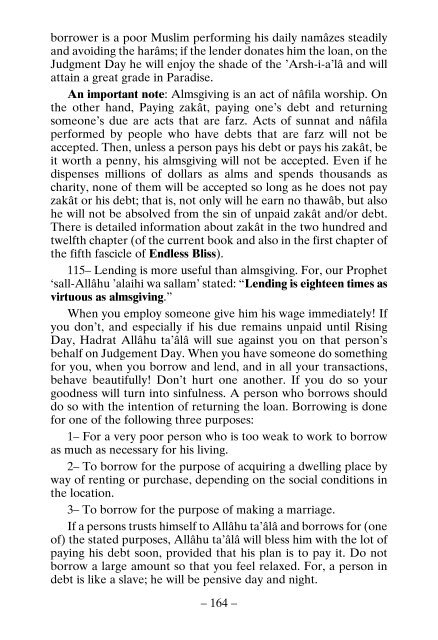O Son !
THE BOOK ‘O SON’ Al-hamdu lillâhi Rabbil ’âlamîn. Wa-s-salâtu wa-s-salâmu ’alâ Rasûlinâ Muhammadin wa Âlihi wa Sahbihi ajma’în. 1– O son! Collecting from books written by the scholars of the Hanafî Madhhab three hundred and sixty hadîth-i-sherîfs and forty-four khabars and also the seven essentials and the five rukns and the seven wâjibs and the fourteen sunnats and the twenty-five mustahabs and the fourteen mufsids of namâz, I have explained them for you. Adapt your acts and deeds to these teachings so that you attain fayz and nejât (salvation)! 2– Also for your information, I have collected a thousand and ninety âdâb (adabs) for you and for other young Muslims like you. If you adapt your actions and acts of worship to these teachings, they will be sufficient for you. If you laze, disobey Allâhu ta’âlâ and cease from these practices and manners, you will be afflicted with slavery and disgrace in the world and subjected to torment in the world to come. If you live up to them and advise your Muslim brothers to do the same, it will be useful for you. They will say blessings over you. And Haqq ta’âlâ will accept their invocations. For, a slave will be pardoned on account of another slave’s invocations for them.
THE BOOK ‘O SON’
Al-hamdu lillâhi Rabbil ’âlamîn. Wa-s-salâtu wa-s-salâmu ’alâ
Rasûlinâ Muhammadin wa Âlihi wa Sahbihi ajma’în.
1– O son! Collecting from books written by the scholars of the
Hanafî Madhhab three hundred and sixty hadîth-i-sherîfs and
forty-four khabars and also the seven essentials and the five rukns
and the seven wâjibs and the fourteen sunnats and the twenty-five
mustahabs and the fourteen mufsids of namâz, I have explained
them for you. Adapt your acts and deeds to these teachings so that
you attain fayz and nejât (salvation)!
2– Also for your information, I have collected a thousand and
ninety âdâb (adabs) for you and for other young Muslims like you.
If you adapt your actions and acts of worship to these teachings,
they will be sufficient for you. If you laze, disobey Allâhu ta’âlâ
and cease from these practices and manners, you will be afflicted
with slavery and disgrace in the world and subjected to torment in
the world to come.
If you live up to them and advise your Muslim brothers to do
the same, it will be useful for you. They will say blessings over you.
And Haqq ta’âlâ will accept their invocations. For, a slave will be
pardoned on account of another slave’s invocations for them.
You also want an ePaper? Increase the reach of your titles
YUMPU automatically turns print PDFs into web optimized ePapers that Google loves.
orrower is a poor Muslim performing his daily namâzes steadily<br />
and avoiding the harâms; if the lender donates him the loan, on the<br />
Judgment Day he will enjoy the shade of the ’Arsh-i-a’lâ and will<br />
attain a great grade in Paradise.<br />
An important note: Almsgiving is an act of nâfila worship. On<br />
the other hand, Paying zakât, paying one’s debt and returning<br />
someone’s due are acts that are farz. Acts of sunnat and nâfila<br />
performed by people who have debts that are farz will not be<br />
accepted. Then, unless a person pays his debt or pays his zakât, be<br />
it worth a penny, his almsgiving will not be accepted. Even if he<br />
dispenses millions of dollars as alms and spends thousands as<br />
charity, none of them will be accepted so long as he does not pay<br />
zakât or his debt; that is, not only will he earn no thawâb, but also<br />
he will not be absolved from the sin of unpaid zakât and/or debt.<br />
There is detailed information about zakât in the two hundred and<br />
twelfth chapter (of the current book and also in the first chapter of<br />
the fifth fascicle of Endless Bliss).<br />
115– Lending is more useful than almsgiving. For, our Prophet<br />
‘sall-Allâhu ’alaihi wa sallam’ stated: “Lending is eighteen times as<br />
virtuous as almsgiving.”<br />
When you employ someone give him his wage immediately! If<br />
you don’t, and especially if his due remains unpaid until Rising<br />
Day, Hadrat Allâhu ta’âlâ will sue against you on that person’s<br />
behalf on Judgement Day. When you have someone do something<br />
for you, when you borrow and lend, and in all your transactions,<br />
behave beautifully! Don’t hurt one another. If you do so your<br />
goodness will turn into sinfulness. A person who borrows should<br />
do so with the intention of returning the loan. Borrowing is done<br />
for one of the following three purposes:<br />
1– For a very poor person who is too weak to work to borrow<br />
as much as necessary for his living.<br />
2– To borrow for the purpose of acquiring a dwelling place by<br />
way of renting or purchase, depending on the social conditions in<br />
the location.<br />
3– To borrow for the purpose of making a marriage.<br />
If a persons trusts himself to Allâhu ta’âlâ and borrows for (one<br />
of) the stated purposes, Allâhu ta’âlâ will bless him with the lot of<br />
paying his debt soon, provided that his plan is to pay it. Do not<br />
borrow a large amount so that you feel relaxed. For, a person in<br />
debt is like a slave; he will be pensive day and night.<br />
– 164 –

















